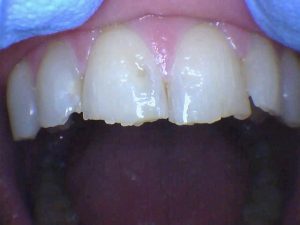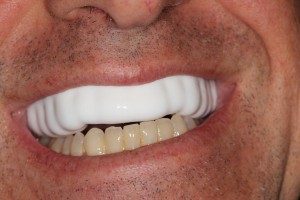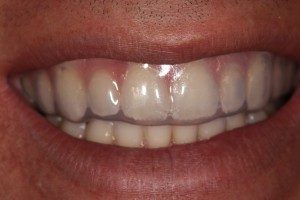
Symptoms of grinding: wear chipping and thin edges
This is the answer we get almost everyday when we broach the subject of teeth grinding with a patient. Patients are often in a state of denial even when we show them the signs.
Often times I find myself saying you may not know you grind your teeth but your teeth do and they are telling me. They talk to me because the back teeth are flattened, front teeth are shortened, thinned, chipped and translucent, and there are numerous teeth that require crowns or have had crowns because of cracks (see photos).The photo may seem extreme but we see gradations of this everyday. These are all signs of tooth grinding. Wear patterns on teeth that are outside the normal chewing pattern are called parafunctional (outside the normal). Slide your teeth out to the side and see if you can make them mesh perfectly. If they do it is highly likely you grind. The key is that teeth do not normally touch during the chewing cycle and when you grind you exert 6 times greater force than chewing causing excessive wear. If you have had to have multiple crowns because of fractured teeth you are probably a grinder.
Another answer is: How can I grind my teeth my spouse says I snore?” That’s a hard one. I wish I knew perhaps you can do both at different times. After we convince the patient that they do grind the next question is:
Why do I grind my teeth?
I wish had a simple straight forward answer but the cause of teeth grinding has been debated for years. Various schools of thought blame:, occlusion(how your teeth go together) others personalty, stress, sleep position and genetics. I worked in the TMJ clinic while in dental school when the old paradigm that claimed it was all about occlusion, the way a patients teeth came together was the cause of grinding was being challenged by the psychological school of thought that blamed it all on stress and personality. One of the joys of being a student researcher was that you were also a subject and I slept with electrodes recording the activity of my jaw muscles at night. Believe me wires and electrodes are not romantic. Having practiced for 38 years I have come to the conclusion it is all of the above, a multifactorial problem that is different for almost every patient. I do know that having practiced a long time and watched families grow I have seen grandparents, parents and children all grind in the same way and often with the same intensity. I do not think that children stay up at night and watch their parents grind to learn how to grind themselves: So I believe there is a genetic component and we can’t change that.
Some people get ulcers when stressed and others grind their teeth. I have also observed that within families the type “A” personalities; successful driven individuals tend to grind their teeth more. In fact, studies show the type A personalty under stress is one to the few factors proven to be associated with teeth grinding. I can testify that I find myself grinding at night if I am under stress. Brandon my son does the same.
Not everyone grinds the same. Some only on one side, some just to the front, others clench straight up and down. Many finally admit that they find themselves grinding during the day in traffic or at work. I guess that’s better than telling off a stupid boss or having a road rage attack.
Treatments
Psychological Approach
You could change your personality, probably not going to happen, you can change your stress, a possibility if you can learn long lasting attentiveness and change like yoga, additional exercise or mediation. You could change your life, job or relationships to remove other sources of stress from your life. None of these is easy. Changing your bite with braces, crowns or teeth adjustments may work but is no guarantee and an irreversible process. Auto suggestion and or self hypnosis does work for some simply being aware and using a mantra of “Lips together teeth apart” can help. This seems especially effective for those who can wake themselves at a particular time without the need of an alarm clock.
Protective Treatments
The simplest treatment is to put something between your teeth so that you cannot damage them. A credit card would work and would probably reduce your financial stress because it would be useless after one night. If you have no problems with your jaw joint and you are good with your hands you may be able to simply make a mouth guard yourself using a kit found on line. We often recommend that asymptomatic patents try this first. The mouth guards on line maybe a little bulky and not fit as well as possible but if you can get used to it you will save a bunch of money. If a patient already has bleach trays we often recommend simply wearing one at night without the bleach in it see if it will stop the grinding. For some simply putting something between the teeth stops the habit. For others they will grind through and break even the toughest materials. Bleach trays will not hold up for long for a dedicated grinder.
If we find you can not tolerate the bulkiness of an over the counter mouth guard or find the bite uncomfortable we can make one for you. To make it more precise we will take impressions send it to a dental laboratory and adjust it to your mouth.
What type of mouth guard is the best?

Internet mouth guard
Upper vs. lower, hard vs soft ,covering all the teeth or just a few, thick or thin, are questions best answered by what works for each individual patient. Everyone is different and we start with the most accepted and effective, a semi soft upper. From there we work to find the type that is most acceptable to the patient.

Dental professional mouth guard
If you have significant jaw problems involving locking, constant pain or difficulty finding your bite we often refer to specialists who treat cases that have gone beyond our abilities and require a device to permanently modify their bite. These treatments are complex, involving numerous modalities and beyond our ability to even explain.
